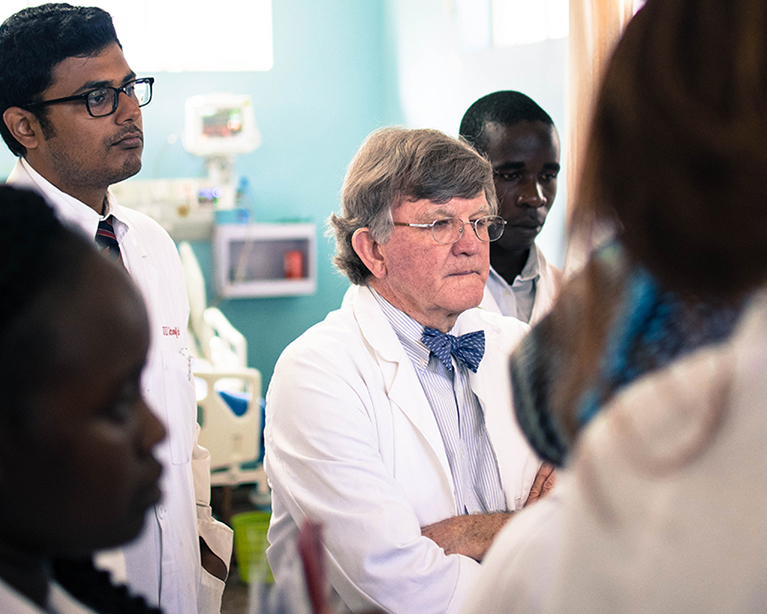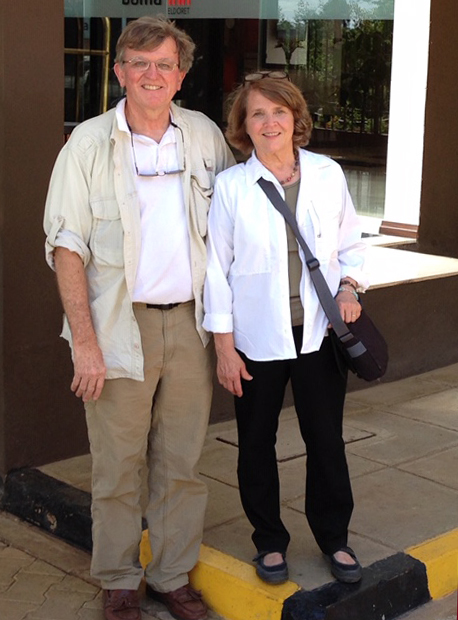People of AMPATH: Dr. John Lawrence, MD, Cardiologist
Cardiologist John Lawrence, MD, provides cardiac care education.
Most doctors and other experts will tell you that it is important to stay active in retirement. John Lawrence, MD, and his wife Dale took that advice to heart…literally.
When Dr. Lawrence retired on October 1, 2010 after 31 years as an interventional cardiologist in a large cardiology group, his bags were already packed. The very next day he and Dale left for Kenya to begin a decade of collaboration with Kenyan and North American colleagues to enhance the cardiac care provided through the AMPATH partnership.
As a young boy, Lawrence frequently looked at picture books of Albert Schweitzer and was inspired to pursue a career in what is now known as global health. When he first became a specialist he was told that there was no room in global health for specialty physicians, so he put his thoughts of global health work aside and focused on helping to build a thriving practice in Asheville, North Carolina.
Decades later, one of the Lawrence’s daughters became a medical resident at AMPATH Consortium partner Duke University. She suggested that her father contact the executive director of the Hubert-Yeargen Center for Global Health at Duke. It turned out the executive director was Dr. Ralph Corey, who had been an intern in internal medicine at Duke when Lawrence was a resident there. “It was really serendipity. This whole thing has been serendipity,” said Lawrence.
Lawrence’s call to Corey came shortly after Duke’s partnership with Moi University School of Medicine and Moi Teaching and Referral Hospital (MTRH) and their selection as one of 11 international research partnerships to receive funding from the National Heart, Lung and Blood Institute (NHLBI), one of the branches of the National Institutes of Health (NIH). Duke was striving to create a Cardiovascular and Pulmonary Disease (CVPD) Center of Excellence in Eldoret and they were in need of a cardiologist to go to Kenya.
“Duke recognized that to do good research you have to have good clinical medicine. They realized the importance of building that part of the program, and hence we were offered the chance to serve,” said Lawrence.
In September, the first Moi University sponsored cardiovascular fellowship will begin at MTRH.
Although the opportunity to practice medicine in Kenya fulfilled Lawrence’s childhood aspiration, it still took him 6-12 months to commit. “This was one of those crazy opportunities in life when everything you wanted to do is one inch from your eyes and you can’t see it,” he said. With Dale’s support, they eventually agreed to a two-year commitment.
Beginning in 2010, the Lawrences spent eight months out of the year in Kenya. In 2014 they started spending four months out of the year there. While Dr. Lawrence has worked with Kenyan colleagues to build the cardiology program, Mrs. Lawrence has assisted in the Sally Test Child Life Program and has worked in orphanages and shelters in the Eldoret area. “I wouldn’t be able to serve if it weren’t for my wife, Dale. She has found her place of service there as well,” said Dr. Lawrence.
John and Dale Lawrence spend several months of the year in Eldoret.
When Lawrence first arrived in Eldoret, he found that there was widespread disbelief that there were serious cardiac problems within the population of western Kenya. In reality, Lawrence seemed to see endemic heart disease everywhere. The devastating effects of rheumatic heart disease, hypertension and heart failure affected all types of patients. The incidence of coronary artery disease was increasing. “There were so many people dying of treatable cardiovascular conditions, and there was only a six-bed intensive care unit for the entire 850-bed medical center,” he said.
“We were faced with typical global health conundrum. ‘Do we go for relief or do we go for development?’ We had to do both,” said Lawrence. “We needed to train people, but also build a facility that allowed us to do what we needed to do to help. Young people were dying all too frequently of arrhythmias that, in properly monitored care-delivery settings, were immanently treatable,” he continued.
Over the next two and a half years, Lawrence and his colleagues in Kenya and North America helped build a cardiology training program while also providing clinical cardiac care. In June 2013, through donations to Duke’s Hubert –Yeargan Center for Global Health received from the Hock Family Foundation and others, the 10-bed Hock Family Cardiac Care Unit (CCU) at MTRH was created and dedicated.
The 10-bed Hock Family Cardiac Care Unit was dedicated in 2013.
Lawrence emphasizes the efforts of many people and their contributions came together to make such strides in cardiac care. He praises the commitment of MTRH to initially dedicate 17 nurses to the CCU and stresses how crucial nurse educators from AMPATH’s North American partners have been in training the Kenyan staff in skills that relate to patient assessment and other aspects of care. Duke and other AMPATH consortium members have also been steadfast in their commitment to bi-directional exchange of medical students and residents, supporting North American student rotations in Kenya as well as Kenyan student, registrar (equivalent to residents) and nurse educational opportunities in North America. Cynthia Binanay, director of operations of the Hubert-Yeargan Center at Duke, played a major role in funding and coordination, Lawrence said.
The contributions of both Kenyan registrars and North American residents have been invaluable to the growth of the program, as have Purdue pharmacy and University of Toronto obstetric sponsored programs, said Lawrence.
There are now three trained cardiologists at MTRH and Kenyan physician Felix Barasa is the head of the Division of Cardiology at MTRH. In September, the first Moi University sponsored cardiovascular fellowship will begin at MTRH after more than five years of planning and review. Two fellows will begin the two-year program. Lawrence said the fellowship welcomes the participation of cardiology teachers from other consortium members.
“Being a part of AMPATH is like being in college again,” he mused. “You sit across the table from someone at dinner who has a great story, and you just make good friends. I feel extraordinarily blessed,” he said. The Lawrences have four children, the last of whom is scheduled to visit Eldoret next year. Lawrence said his children seem proud of what has been accomplished and have supported their parents’ work every step of the way.
“For someone who was not on an academic track during his career years to have an opportunity like this in retirement and to be able to use what he has learned and share it…what a gift! I feel like the luckiest person in the world,” he concluded.




